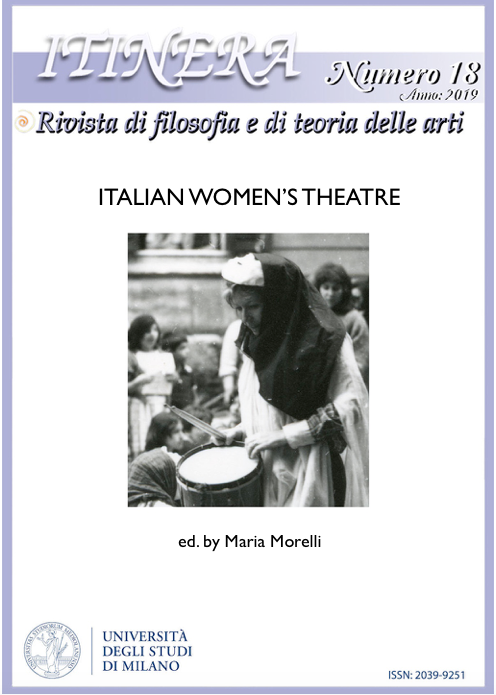«Non sono una madre come si deve»: Terremoto con madre e figlia di Fabrizia Ramondino
DOI:
https://doi.org/10.13130/2039-9251/12692Abstract
Using the interruption of menstruations in the mother and still absent in the daughter as physical evidence of the broken relationship between the two women protagonists of Terremoto con madre e figlia, my reading of the play reflects on the economy of such relationship. The mother historicizes the years of feminist and political commitment and her dedication to teaching through the presence of her daughter who completely refuses her mother’s teachings. Yet, the presence of the daughter serves as an alibi – from another dimension – for the author to autobiographically reflect on the horizon of the most important events of her existence. Relational contingency allows the mother to build her personal testimony of the Utopia of the Sixty-eight.
Downloads
Riferimenti bibliografici
BEAUVOIR de, Simone, The Second Sex (1952), tr. ingl. di H. M. Parshley, Penguin, Harmondsworth 1984.
BOLAÑO, Roberto, Amuleto, Adelphi, Milano 2010.
BRAVO, Anna, “Introduzione”, in L. Monaco (a cura di), La deportazione femminile dei lager nazisti. Atti, Franco Angeli, Milano 1995, pp. 15-27.
BUTLER, Judith, Gender Trouble: Feminism and the Subversion of Gender Identity (1990), Routledge, New York 2007.
CAPITTA, Gianfranco, “Scene da un terremoto”, Il manifesto, 2 luglio 1993.
CAVARERO, Adriana, Tu che mi guardi, tu che mi racconti, Feltrinelli, Milano 1999.
D’AMORA, Mariano, “Mutazioni socio-culturali in Terremoto con madre e figlia”, in A. Giorgio (a cura di), «Non sto quindi a Napoli sicura di casa». Identità, spazio e testualità in Fabrizia Ramondino, Vol. 8, Morlacchi Editore, Perugia 2013, pp. 319-333.
D’ANGELI, Concetta, Leggere Elsa Morante. Aracoeli, La Storia, e Il mondo salvato dai ragazzini, Carocci, Roma 2003.
FARNETTI, Monica, “Per un’eretica della storia: l’opera autobiografica di F. Ramondino”, L’illuminista, 43/44, 2015, pp. 319-330.
GANDOLFI, Roberta, “Teatro e oralità nella stagione dei movimenti”, in D. Orecchia, L. Cavaglieri (a cura di), Fonti orali e teatro. Memoria, storia, performance, Alma DL University of Bologna Digital Library, Bologna 2018, pp. 167-180.
GIORGIO, Adalgisa, “«Non sto quindi a Napoli sicura di casa». Identità, spazio, testualità in Fabrizia Ramondino”, L’illuminista, 43/44, 2015, pp. 215-249.
LEOGRANDE, Alessandro, http://www.minimaetmoralia.it/wp/ramondino-e-i-misteri-di-althenopis/
LUCAMANTE, Stefania, Quella difficile identità: Ebraismo e rappresentazioni letterarie della Shoah, Iacobelli, Pavona (RM) 2012.
MARTONE, Mario, “Note di regia”, in F. RAMONDINO, Terremoto con madre e figlia, Il Melangolo, Genova 1994, pp. 147-149.
RAMONDINO, Fabrizia, “Il mio Sessantotto”, L’Illuminista, 43/44, 2015, pp. 59-66.
– Terremoto con madre e figlia, Il Melangolo, Genova 1994.
STELLIFERI, Paola, Il femminismo a Roma negli anni Settanta: percorsi esperienze e memorie dei collettivi di quartiere, Bononia University Press, Bologna 2015.
Dowloads
Pubblicato
Come citare
Fascicolo
Sezione
Licenza
Gli autori che pubblicano su questa rivista accettano le seguenti condizioni:
1. Gli autori mantengono i diritti sulla loro opera e cedono alla rivista il diritto di prima pubblicazione dell'opera, contemporaneamente licenziata sotto una Licenza Creative Commons - Attribuzione - Condividi allo stesso modo 4.0 internazionale che permette ad altri di condividere l'opera indicando la paternità intellettuale e la prima pubblicazione su questa rivista.
2. Gli autori possono aderire ad altri accordi di licenza non esclusiva per la distribuzione della versione dell'opera pubblicata (es. depositarla in un archivio istituzionale o pubblicarla in una monografia), a patto di indicare che la prima pubblicazione è avvenuta su questa rivista.
3. Gli autori possono diffondere la loro opera online (es. in repository istituzionali o nel loro sito web) prima e durante il processo di submission, poiché può portare a scambi produttivi e aumentare le citazioni dell'opera pubblicata (Vedi The Effect of Open Access).





